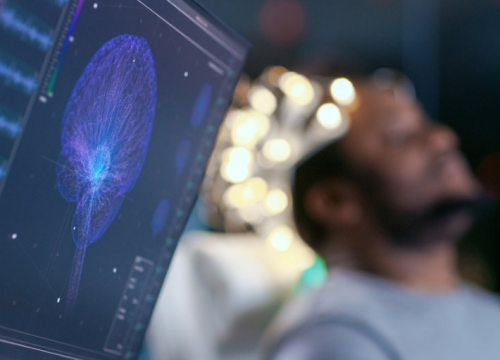Considering Deep Brain Stimulation
Deep Brain Stimulation (DBS) is a neurological surgery for the treatment of Parkinson's disease (PD) symptoms. DBS was approved for use in PD in 2002 by the US Food and Drug Administration (FDA) and thousands of people receive the benefits of DBS. Are you a good candidate for DBS?
Learning About DBS
There are several important steps to be taken when considering DBS surgery. The first is to learn about this procedure. Read, gather opinions and talk to your doctor about DBS. It can be beneficial to talk to someone who has already underwent it. If you don't know someone who has been through the DBS surgery process, reach out to a local support group to see if a group member might be willing to talk to you about their experience.
Consult with a Neurologist and a Neuropsychologist
After learning more about DBS, the next step is to make an appointment at a center that specializes in the surgical treatment of Parkinson's. It is important that anyone considering this surgery be evaluated by a neurologist who is familiar with the procedure, expected benefits and potential risks. If a neurologist thinks you are a good candidate for surgery, and you decide to proceed, meet the neurosurgeon to learn more and prepare for surgery.
Neuropsychological testing is also strongly recommended before proceeding with DBS. This test is often standard to ensure DBS is a good option and help determine how it could affect memory and thinking. DBS will not improve or worsen non-motor symptoms associated with Parkinson's.
Are you a good candidate for DBS?
The best candidates for DBS surgery are people who:
- Have been diagnosed with Parkinson's for five years or more
- Have disabling tremors and dyskinesias (involuntary movements of the face, arms, legs or trunk) or severe motor fluctuations
- Experience severe motor fluctuations that cannot be controlled with adjustments to medication schedules
- Often experience significant dyskinesias interspersed with rapids wearing off and off time crises throughout the day
Not everyone is a good candidate for this surgery. It is important to know that some Parkinson's symptoms respond well to DBS and others do not. The decision to undergo surgery depends on a critical assessment of each person's specific symptoms.
Symptoms that respond well to intervention include:
- Tremor
- Stiffness
- Bradykinesia (slowness of movement)
- Dystonia (sustained or repetitive muscle twisting, spasm or cramp
- Dyskinesia
Several factors influence the outcome of DBS. One of the best forecasts is your response to levodopa. People whose symptoms still respond well to individual doses of the drug and who have mobility during their "on" periods usually have better results with DBS.
While some people think DBS should not be considered until Parkinson's medications have become completely ineffective, this is not true. When medications stop working completely, deep brain stimulation won't work, either. Surgery promises more effectiveness for those who experience complications with medications, such as dyskinesias, but continue to respond well to levodopa.
Those who respond well to DBS tend to be people who:
- Respond to carbidopa-levodopa
- Have had typical Parkinson's for more than
five years - Can tolerate surgery well
- Don't have severe cognitive issues or
changes in cognition - Have a good support network of family and friends who can be involved in learning about the DBS system and process
Reasons someone is not an ideal DBS candidate include:
- Not having typical Parkinson's
- Not responding well to levodopa
- Has severe dementia, apathy, depression, poor health and poor family support.
Preparing for DBS Surgery
Working closely with your surgeon and your movement disorder clinicians will help you to determine if DBS is right for you. There are currently three DBS systems available that the neurosurgeon should discuss with you — ask for details on each device. Not every DBS surgeon works with all three systems, so it is important that you consider your choice of system and surgeon.
It is beneficial to have a family member or loved one attend DBS-related appointments with you. There are a lot of appointments necessary when considering or receiving DBS, and it is helpful to have an extra person to ensure all the details are covered and necessary questions are asked. If you do get the DBS system surgery, it is extremely important that loved ones or care partners understand the DBS system and how it operates. Older age does not exclude those who are otherwise healthy from being a possible candidate for DBS.
Every person will have unique post-surgery goals. If you are considering DBS, have a clear idea of what may or may not be achieved and manage expectations of how DBS will benefit you.
It is important to remember that deep brain stimulation is an elective procedure. Neurologists and neurosurgeons will make their recommendations, but you and your family make the final decision. Although DBS is not a cure for Parkinson's and does not stop the progression of the disease, it can dramatically reduce some PD motor symptoms and significantly improve the quality of life for suitable candidates.
Seven Steps to Deciding if DBS is For You
- Talk to your neurologist
- Get information about deep brain stimulation
- Talk to someone who has already had deep brain stimulation with a PD diagnosis
- Visit a center that specializes in surgery for PD
- Make an appointment with a neurologist at the center
- Meet the neurosurgeon
- Meet with a neuropsychologist to have a neuropsychiatric evaluation done
Printing made possible with an educational grant from Medtronic. Content created independently by the Parkinson’s Foundation.

Related Materials
Related Blog Posts

Neuro Talk: Surgical Options

An Illustrated Introduction to Your Brain
